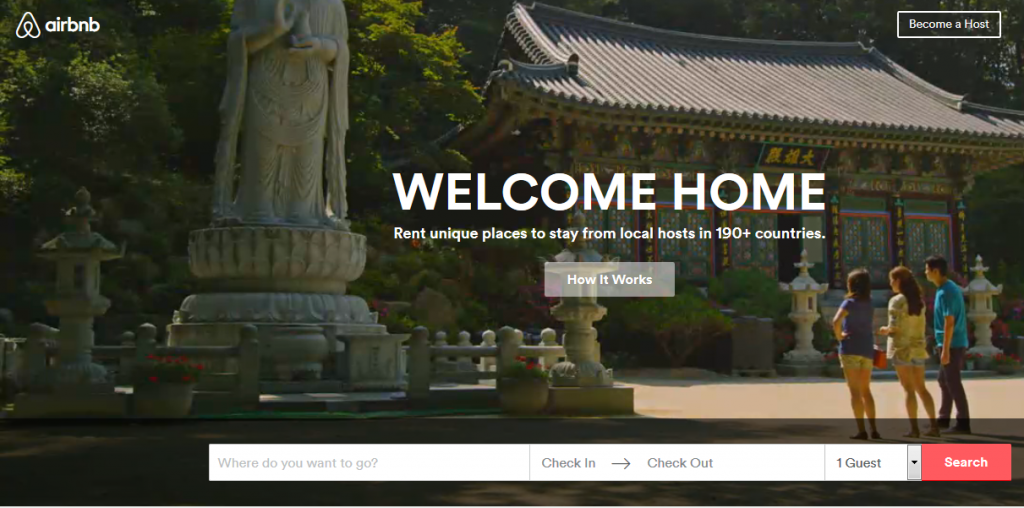For liberal arts students without a Computer Science degree, tech start-ups might seem like an odd choice for a career path. But tech companies require far more than just code writers. They need a wide range of people to run the business, market its products, and connect with end users. And they’re actively seeking liberal arts grads to fill those roles.
Just ask Ada Ruzer ’11, who majored in Comparative Sociology, minored in Art History and now recruits for tech start-up Airbnb. Ada took a break from her recruiting activities to talk to CES about her career path thus far, and offers insight into the vibrant start-up community of the Bay area.
 CES: Tell us about your career post-graduation. How did you get to where you are now?
CES: Tell us about your career post-graduation. How did you get to where you are now?
Ada: After graduating Puget Sound in 2011, I moved to Israel to work as an Israel Teaching Fellow for 10 months. As a Fellow, I taught English to elementary school children in a small Israeli city and participated in weekly educational seminars. Seminars allowed me to travel the country and interact with various communities, gain insight into a myriad of viewpoints, and make incredible connections with the land and its people.
After moving back to the Bay Area, I began working as a Groups Coordinator for a Jewish non-profit. However, I quickly realized that I wanted to get involved in the start-up world that was quickly taking over the Bay Area. As a result, I joined ZeroCater, a food start-up that connects tech companies with food trucks and local restaurants. I curated menus, provided logistical and operational support for start-ups big and small (think Reddit and Box), and worked closely with office managers to create personalized employee experiences.
My position there led me to develop a passion for employee experience and cultivating company culture. I found myself drawing on my CSOC training, as I engaged with people with diverse interests, backgrounds, needs, and communities.
CES: You’ve worked at more than one tech start-up in the Bay area–what’s that like? How has your liberal arts degree proved valuable in that environment?
Ada: Start-ups are dynamic spaces where there is constant opportunity for growth and on-the-fly learning. You’re expected to be thinking constantly about how to bring ideas and people together in order to solve a difficult problem in a more innovative, efficient, and beautiful way. I think this directly ties into my liberal arts background. At Puget Sound, I was encouraged to collaborate, engage in cross disciplinary thinking (Connections classes were my favorite!), and approach problems and solutions from a variety of angles.
CES: Why would somebody want to work for Airbnb? What kinds of roles might appeal to Puget Sound students?
Ada: I was drawn to Airbnb because global community and creating a space where people can belong anywhere are pillars of the company and also my personal philosophies.
In my role, I’m immersed in helping our company and culture grow. I have the pleasure of collaborating with our engineering team and developing relationships with new grads and underclassmen candidates who are passionate about scaling human connections.
Airbnb is invested in communities around the world with a product that is allowing people to build connections thousands of miles apart. They’re helping to redefine the way we travel, the way we engage and invest in local areas, and promoting conversations between hosts and guests from around the world.
This global mindset directly aligns with Puget Sound’s desire to create global thinkers. Accordingly, there are community organizer positions, policy opportunities, employee experience, and customer service roles that I think Puget Sound students would find interesting and challenging.
CES: You recruit for technical talent at the university level. What tips do you have for students looking for technical roles?
Ada: Experience—Airbnb looks for experience above all else. For undergrads, internships are the best way to get exposure and really hone the correct technical skills. I also recommend exploring Hackathons, spear-heading projects or collaborating with friends to develop a start-up or app.
CES: You were the CES Peer Advisor when you were a student and you helped many of your fellow Loggers prepare for their post-graduation plans. What career advice do you have for current students now that you’ve been out in the professional world?
Ada: I definitely benefited from taking time between employment and school. I learned so much while being abroad, and gained a better understanding for what I was and wasn’t passionate about.
Ask Questions: As a new grad, its incredibly important to speak up—ask questions and seek clarification on projects. I think many new grads have a desire to please and are nervous to ask necessary follow up questions. Set yourself up for success!
Inquire about Growth: Perks at start-ups are enticing—the food, the relaxed atmosphere, happy hours, etc. However, perks quickly lose their glamor if they are not backed by professional growth opportunities and well-rounded leadership. Make sure you’re entering a space that is invested in making your job not just a job, but a career. Inquire right away about what kind of growth opportunities the job holds and the mentorship available.
Curious about the tech industry? Check out Airbnb’s University page to learn more about the opportunities available for Interns and New Grads.
Photo Credits | Courtesy of Ada Ruzer
© 2016 Career and Employment Services, University of Puget Sound (edit)